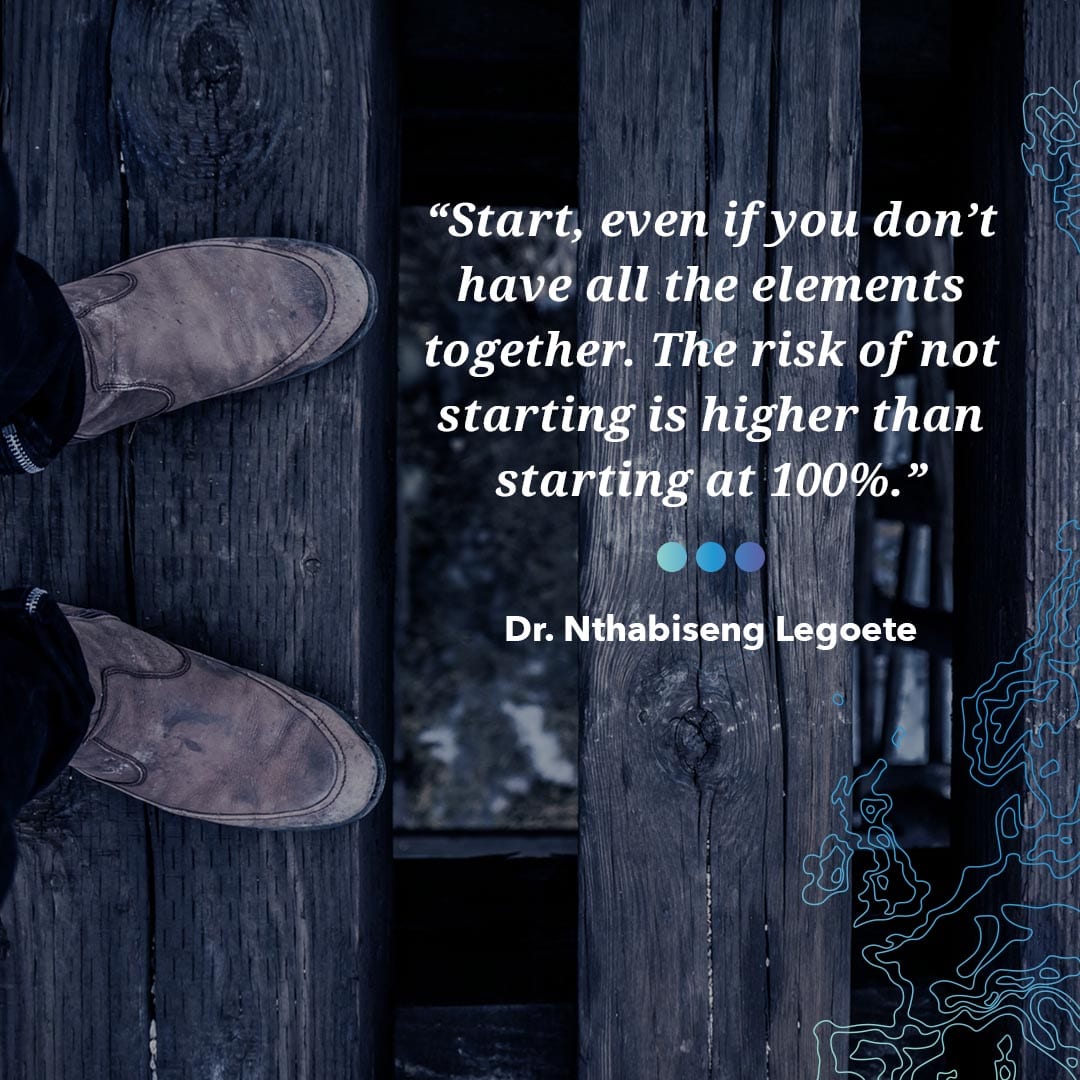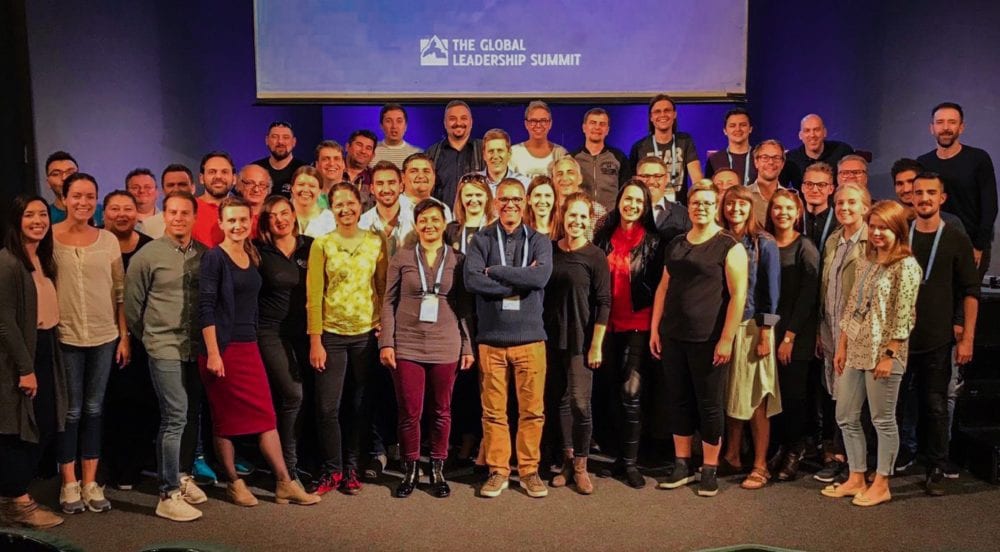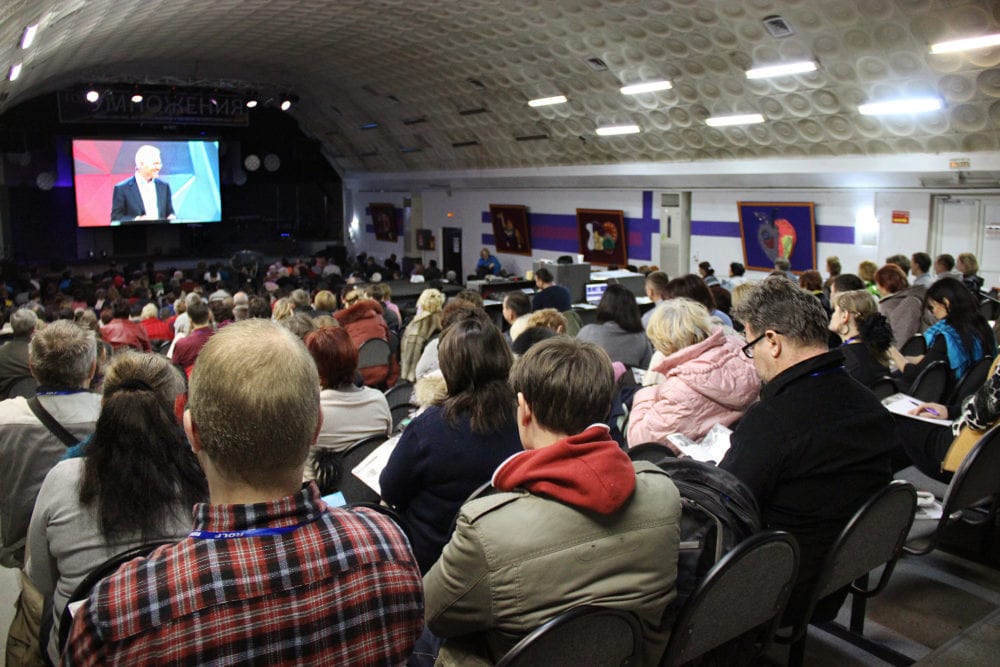
The true measure of success will be the number of people touched and transformed by our success.

The true measure of success will be the number of people touched and transformed by our success.

Wilfredo De Jesus reminds leaders that responses to cultural changes are vital to their influence and need to be handled wisely.

Start, even if you don’t have all the elements together. The risk of not starting is higher than starting at 100%.

My wife and I dropped off our youngest daughter to start university this fall. To say I was sad to leave Grace thousands of miles away is an understatement. Sure, I’m happy for her to spread her wings and start this new chapter, but she and I have always been close and I’m not ready to let her go.
When it came to the dreaded moment of saying goodbye, I worked hard to apply the recurring advice I had received from countless friends. “Dave. Hold it together. Nobody wants to see their parents cry and particularly not their dad.”
I watched these farewells play out all weekend as other parents were going through the same ritual. A lot of moms were crying, not many dads, and few if any students.
Similar differences played out across different ethnic groups, with affective cultures doing little to disguise their tears and neutral ones looking stoic. Grace knows me too well not to have seen through my artificial smile and wavering voice, but I kept a stiff upper lip as I gave her a final hug and watched her walk away.
And cultural intelligence is built from a premise of self-awareness, a critical part of emotional intelligence.
Emotions play a powerful part in every relationship—first and foremost among our family, but also among our friends and colleagues. This is why our social media feeds are filled with articles about things like: “7 secrets to deal with toxic behavior”, ”4 ways to project more confidence” or “5 ways to handle a friend who gives you the silent treatment.”
But almost without fail, these articles seem to assume we’re all Westerners interacting with other Westerners. We’re repeatedly told to look people in the eye, speak up for yourself, smile while you speak, and similar platitudes. But many of these tips will get you in trouble if blindly applied to colleagues and friends in a diverse and global world.
So, what do we do? “Common sense” isn’t enough, but we can’t possibly learn the dos and don’ts for every culture we encounter. Even if we could, those generalizations are often wrong.
Here are a few starting points for handling the emotional side of our day-to-day interactions:
Emotional intelligence, the ability to detect and manage the emotions of yourself and others, is proven to play a critical role in being a strong leader, fostering team collaboration and forging healthy family relationships. But the challenge comes when you detect and respond to the emotional expressiveness from someone who grew up with a different set of guidelines for what’s appropriate when and with whom. That said, I have little confidence you can be culturally intelligent if you aren’t first able to read and react to the emotions of people from familiar cultures. And cultural intelligence is built from a premise of self-awareness, a critical part of emotional intelligence.
We often stereotype certain genders, ethnicities and even functions and professions as being the “emotional” types. But if you’re human, you’re emotional. There is a set of universal triggers that elicit the same emotion in nearly all of us. For example, the sight of something coming straight at you triggers fear, regardless of your personality or culture. A similar trigger occurs when experiencing the unexpected, such as rough turbulence in flight. Even seasoned flight attendants admit that when they don’t expect it, a sudden jolt in the air frightens them. In a world of robots and AI, it’s worth coming back to one of the most important elements that connects us as humans—our emotions. There are important norms worth learning for various situations and cultures that guide how much we should unveil our emotions. But we need to free ourselves and others from thinking some people are emotional and others aren’t.
Paul Ekman’s groundbreaking work on facial expressions finds that people from all over the world express sadness, fear, anger, surprise and happiness using similar facial expressions. I was initially skeptical of this finding. But through a series of renowned, peer-reviewed studies, Ekman makes a convincing case that people all over the world signal happiness with the corners of their mouths up and their eyes contracted. Anger is expressed with the corners of the mouth down and sadness is expressed with the eyelids drooping. Even individuals who have been blind from birth manifest the same nonverbal expressions. And Ekman found that indigenous tribes without exposure to outside groups used some of the same basic facial expressions as others around the world.
There’s no substitute for emotional intelligence as the first step in improving the way you work and relate with others.
Where cultural differences begin to come into play are the rules for how to manage emotional expressions appropriately. Parents teach children the display rules for various occasions, which get reinforced at school, through the media and with peers. When should you show emotion, when should you exaggerate it, and when should you mask it? We develop mechanisms for masking seemingly inappropriate expressions and learn when we should fake it. So even though a highly trained expert can spot disgust or sadness across faces from a variety of cultures, most of us miss it when an individual disguises their emotions with a behavior they’ve learned.
I’m an eternal optimist. I don’t spend too much time thinking about regrets and in times of disappointment, part of my coping mechanism is to focus on the positive. Some of that is personality driven, but it’s also a reflection of culture. A series of studies comparing Germans’ and Americans’ sense of time illuminated the role of culture in how people view the past, present and future. Germans are more likely to look at the negative implications of past events while Americans are more likely to focus on the positive.
American cyclist Lance Armstrong described cancer as the best thing that ever happened to him, whereas German actor Michael Lesch described cancer as a horrifying experience that continued to create a never-ending sense of anxiety for him. This aligns with recurring sentiments found among many Americans and Germans at work. U.S. employees typically resist talking about their failures and indirectly refer to them as areas for improvement. Germans view that approach as rubbish and talk openly about failure and spend little time praising one another for their achievements.
Cultural intelligence stems from the same body of research as emotional intelligence (EQ). There’s no substitute for emotional intelligence as the first step in improving the way you work and relate with others. But cultural intelligence takes it the next step by allowing us to have those same social sensibilities when interacting with people who behave in ways that are unfamiliar to us.
Giggles may mean laughter in one culture and embarrassment in another. Some individuals have been socialized to express anger by yelling while others simmer in silence. Public affirmations may be encouraging in one context and humiliating in another.
There’s certainly value in using some of the tips and pointers from various articles about how to project confidence, get better at small talk or manage conflict.
Just read them with a culturally intelligent eye and consider which tips need to be adapted for various groups.
This article originally appeared on Management. Issues website.

Brad Lomenick shares the approach leaders should take when it comes to planning for succession.

We all know stories are important. But when was the last time you sat and just listened? Really listened? Setting your worldview, experiences and preferences aside and stepped into someone else’s mind’s eye?
Why do they sacrifice so much for an event that is created in Chicagoland then repackaged and shared all over the world?
I had the privilege to travel overseas for a training that brought our European partners together to learn about The Global Leadership Summit’s values, goals and how to execute the Summit in their region. Included in that group of leaders were local tech coordinators, country producers, event managers and marketers.
During the training, I was continually amazed by how much work and effort goes into pulling together a GLS. These leaders come with passion and are committed to excellence, ready and eager to learn. They put aside personal vacations, family time and work. Our partners make great sacrifices to see that the Summit is created in such a way that the experience leaves a mark on each attendee’s spirit.
I became really curious. Why? Why do they sacrifice so much for an event that is created in Chicagoland then repackaged and shared all over the world?
For an eager, extroverted millennial like me, the listening part can be difficult. But I’m so glad I did. I can’t share their full stories, names, or countries, but here are some conversations that helped me understand why they make such sacrifices.
Their experiences of scarcity, bombs, war and a colorless world have shaped who they are today.
One leader told me stories from his of being “the family runner.” As the youngest kid in the family, he would make runs to get necessities and often stood in line for nearly 3 hours for bread, toilet paper, laundry detergent, etc. Sometimes he’d finally make it to the front of the line only to be re-directed to another line. It wasn’t uncommon for him to make it to the counter only to be told they were out of whatever he needed. When he saw a line begin to form nearby, he’d quickly step into it, not knowing what he’d receive at the end. “If they were giving something out, who cares what it was? I just wanted to be sure I didn’t miss it. Everyone felt that way.”
“A really great thing,” some of them told me, “was celebrating when school closed. It was fun to hang out with friends. But unfortunately,” they said, “it closed because of the war. That wasn’t fun.” The way they said this in a matter-of-fact tone saddened something inside me.
One remembered being in the streets playing football with friends when they heard bomb sirens. They grumbled because they had to run inside while planes streamed overhead. “Again?” they would grumble. They just wanted to play football.
I admired one woman who was always dressed fashionably and I asked her about her style. She told me she loves colorful clothes because as a kid she wore gray every day. Growing up, she was surrounded by a sea of gray that covered everything—streets, buildings, clothing. Now, she expresses herself with colors and patterns and she doesn’t take that for granted.
Leadership matters. Stories matter. And when those two things intersect, God can do amazing things.
These are their stories. Their experiences of scarcity, bombs, war and a colorless world have shaped who they are today.
Because they know what bad leadership looks like. They’ve lived it, experienced it and they believe that change requires God-inspired leadership. They are grateful for the strides their countries have made toward better leadership. But more importantly, they know the fight must continue. There is great work to be done and these leaders won’t tire until their children and their children’s children are ensured a different childhood than the ones they experienced.
Leadership matters. Stories matter. And when those two things intersect, God can do amazing things. We are honored to support these leaders as they seek change for their communities. Let’s keep doing all we can to ensure they can continue creating a brighter tomorrow.

Jason Jaggard challenges leaders to move past the common practice of using anxiety to motivate for performance.

Every Tuesday and Thursday morning at 8:30 am CST, our staff gathers together to pray for our partners across the globe.
Please join us in prayer as we lift up the international Summit events happening this weekend. Pray for God’s anointing on every detail and that those who attend would leave feeling equipped, inspired and encouraged to lead the change they long for in their communities.
And if you have a prayer request, please share it with us. We would be honored to pray with you!
Aktau, Kazakhstan
Mogok, Myanmar
We know there are a lot of things God has in store for Myanmar, and we hope to see this coming into play.
Barcarena, Brazil
Chimaltenango, Guatemala
Gitega, Burundi
I want to see a country where we don’t have stealing and corruption—where the Church and the Christians are doing what God wants us to do. That’s what I want to see in Africa, not just in Burundi. That is the desire crying in my heart.
Kyiv, Ukraine
Maradi, Niger
Travail, Ivory Coast
Maiduguri, Nigeria
Taichung, Taiwan
Kumba, Cameroon
Mbour, Senegal
Vilnius, Lithuania
Nyeri, Kenya
We need leaders. Our passion is that through the GLS, God will help us create leaders who will uplift the people so that corruption will be dealt with. We’re praying for a movement of leaders who view people as men and women created by God. As leaders, we are here to serve so people can achieve their God-given calling.
Cana do Carajas, Brazil
Uralsk, Kazakhstan
San Luis Potosi, Mexico
Minsk, Belarus
Vilnius, Lithuania
35% of the participants are not from the faith community. As a result of the Summit, they often start attending church. Many leaders who attend, leave wanting more, desiring a community where they can learn year-round.
Mwanza, Tanzania
La Romana, Dominican Republic
Somotillo, Nicaragua

Whoever tells the best story shapes the culture.

Get free, instant access to GLS Podcast Episode Show Notes. Leverage episode summaries, key takeaways, reflection questions, resources mentioned, related links and applicable downloads, including Show Notes PDF and Episode Audio File (MP3).
How do you lead when you experience seasons of unexpected disappointment, betrayal and loss? In this episode, activist and author Christine Caine talks with Jeff Lockyer about her book Unexpected and the journey that prompted it. She shares how giving up the façade of control brought her closer to God and why she didn’t quit. She also explores the practical steps leaders should take to bring about the calm resolve needed to move forward and lead from a healthier place.
RELATED LINKS:
“We welcome and encourage comments on this site. There may be some instances where comments will need to be edited or removed, such as:
If you have any questions on the commenting policy, please let us know at heretoserve@globalleadership.org”
Recent Comments